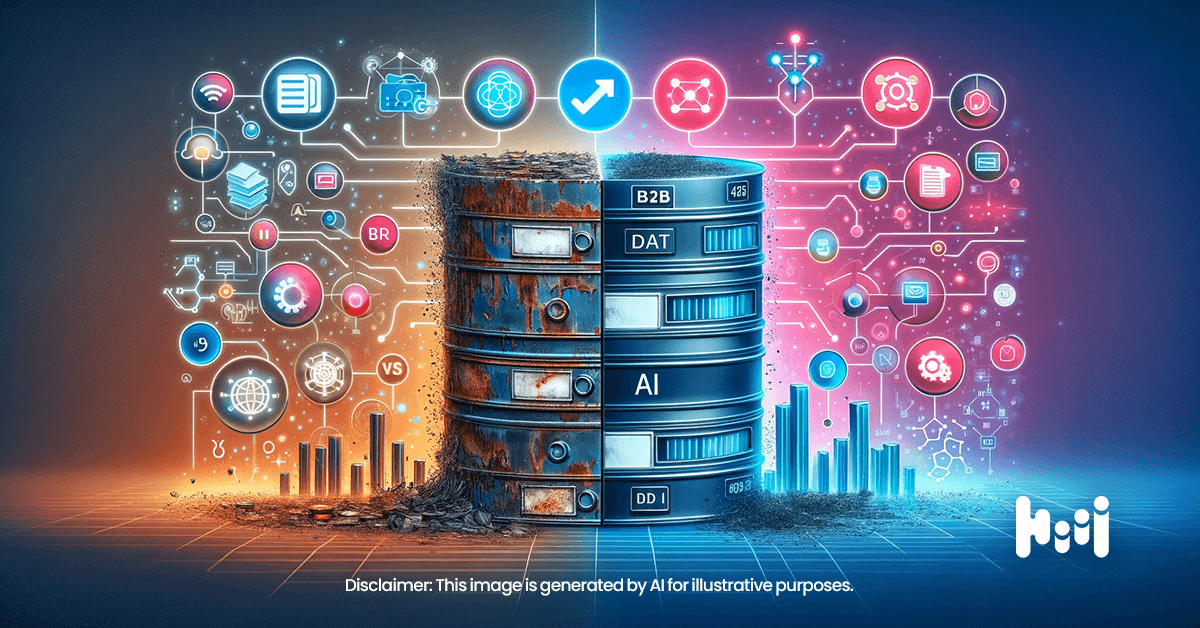Artificial intelligence is more than the latest buzzword. It’s creating a fundamental shift in the ways in which B2B salespeople do their job, with more than one-third of businesses currently using AI to achieve their business goals.
And this number is set to increase. Gartner predicts by 2025, 75% of B2B organizations will rely on AI technology to improve their sales strategies. And Gartner’s own VP Analyst, Steve Rietberg even says, “Sellers can no longer exclusively rely on intuition-based selling to push a deal over the finish line. Tomorrow’s sellers must learn to use data today to effectively manage their sales cycles, as the use of information will become more critical to their success over time.”
If you’re wondering how to incorporate artificial intelligence into your own B2B sales processes, then you came to the right place. Here’s everything B2B sales leaders need to know about AI, its ROI impact, and how it can help drive marketing revenue to pad the bottom line.
Artificial Intelligence Sales and Marketing Impact
Data-driven decisions help sales and marketing leaders make more informed choices. But if you’re drowning in data, analysis paralysis sets in, and information hinders rather than helps the decision-making process.
This is where AI comes to the rescue. Artificial intelligence helps sales teams quickly crunch through terabytes of data to transform it into actionable insights. AI can also streamline and automate business processes that would normally require hundreds of hours of research and human effort to complete.
This efficiency can be applied to various areas throughout selling process.
However, different types of AI technology are better suited for certain business applications than others. Here’s a quick breakdown:
1. Predictive Analytics
Predictive analytics use the power of AI, usually in the form of machine learning (ML), to predict probable outcomes. For example, it can generate predictive models that forecast buyer intent, identifying which leads among the bunch are most likely to make a purchase.
This is a go-to tool for modern B2B salespeople, helping them predict the behaviors of prospects and enabling them to adjust their approach accordingly.
2. Prescriptive Analytics
Prescriptive analytics help B2B sales teams determine the most optimal course of action to help propel conversion. By tracking multiple “what if” scenarios and existing conditions through prescriptive analytics, sales reps can uncover recommended next steps to improve efficiency in certain areas of the sales cycle, which helps drive more results.
3. Natural Language Processing (NLP)
NLP uses AI to analyze, document, and in some cases, automate conversations between vendors and customers. Advanced applications of NLP can even distinguish user sentiment to help fine-tune lead segmentation and optimize the user experience.
Sales chatbots are an example of NLP in action. Phone bots take things a step further, learning and analyzing human speech to generate appropriate responses.
4. Content Personalization
AI can help salespeople and marketers deliver personalized content experiences based on multiple intent data sources. This includes social media, message boards, SaaS review websites, and customer intelligence platforms, among (many) other sources.
Personalized marketing not only results in higher customer engagement; it also enables B2B companies to stand out from the rest of the pack.
5. Diagnostic Analytics
Diagnostic analytics work to unveil possible reasons behind a particular outcome or problem. AI solutions quickly generate data-driven diagnoses and provide actionable remedies to boot. When things go wrong, B2B sales teams can take action fast, find out the “why” of the situation, and ensure it doesn’t happen again.
6. Intelligent Process Automation (IPA)
McKinsey describes IPA as “taking the robot out of the human,” thanks to its ability to carry out the repetitive, routine tasks that eat away at our time. This saves B2B sales and marketing teams both precious time and money.
Here’s a scenario to consider: sales representatives may spend several hours per week on data entry. This costs businesses thousands of dollars annually for every sales rep that burns company time on repetitive tasks.
Using AI, B2B organizations can easily and reliably complete these processes without depleting all their sales team’s resources. This allows salespeople to dedicate their full attention to more valuable tasks, like making sales calls or meeting up with high-priority leads.
How to Use AI-Guided Selling in B2B: Five Examples
Artificial intelligence clearly has a lot of potential, but how can you make it a part of your day-to-day practice? Here are five examples to inspire you:
1. Augment Lead Scoring
The goal of lead scoring is to highlight high-value and high-priority prospects.
Lead scoring systems generally custom fit to the needs of each target account. They rely on existing customer data to establish defining traits, behavior, and other intent signals that can increase or decrease a prospect’s level of priority, or “score.”
With the help of AI and ML, massive amounts of previous customer data can be analyzed to construct lead scoring models. This helps B2B sales teams identify and engage their ideal prospects.
2. Streamline Lead Nurturing
Lead nurturing involves the ongoing engagement of target customers to encourage them further down the sales funnel.
It encompasses a range of content and communication channels, such as newsletters, webinars, product demos, free consultations, and live events.
AI—particularly AI-assisted content personalization, NLP, and predictive analysis—enables B2B marketers and salespeople to formulate the best strategy for engaging individual leads. It helps them deliver content that directly addresses the prospect’s challenges, encouraging them to take the next step in the buyer’s journey.
3. Automate Sales Processes
Obtaining contact-level insights allows B2B organizations to craft automated sales experiences and engagements, ensuring maximum opportunity for conversion.
The use of chatbots, email automation, and self-service consultation bookings are great examples of how automation technology enhances the buyer experience for digital-first audiences and creates a streamlined sales process.
And speaking of time, automation returns a ton of it back to B2B teams. Tedious tasks like data entry and scheduling can be left to AI so reps can focus more time on building relationships with top prospects.

4. Personalize Marketing
AI-powered solutions provide B2B businesses with deeper insights into each individual buyer’s journey.
Sales reps can leverage AI to analyze months’ worth of customer data in a fraction of the time, identifying which communication channels, product offers, and talking points resonate most with target, in-market buyers.
AI-powered platforms also help B2B organizations conduct competitor displacement campaigns. By analyzing a prospect’s technology stack and online activities (e.g., searches for product alternatives, negative product reviews), B2B sales teams can send timely offers that encourage leads to switch solutions.
5. Make Demand Forecasting More Reliable
Demand forecasting aims to predict the demand for services or products based on historical data.
AI can step in and process historical sales data en masse, generating reliable predictions at such a record rate that manual calculations could never achieve.
AI and ML can also work in tandem to make quick adjustments based on patterns and changes in customer behavior. This makes B2B forecasting virtually immune to demand volatility, which is especially handy in times of economic uncertainty.
Realize the Potential of AI in B2B Selling
The use of artificial intelligence in B2B sales is growing—fast. But before diving into AI and all its functionalities, B2B sales and marketing teams should first get a full understanding of the various technologies available to determine which ones best support the needs of their business. With these insights in place, teams can take full advantage of AI’s benefits and create an AI-driven strategy to scale conversion with streamlined efficiency.
***
To learn more about AI-guided selling, download our benchmark report “The AI Impact on B2B Sales.”












